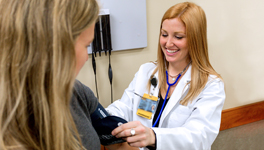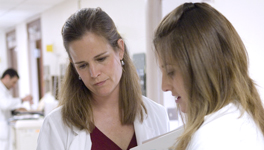
11/19/2015
Elizabeth Cohen
Elizabeth’s Story
Dr. Cohen received her Bachelor of Arts degree in Chemistry from Boston University. She started working in a pharmacy and made the decision to attend pharmacy school because Dr. Cohen loved helping patients. She attended Massachusetts College of Pharmacy and Health Sciences, in Boston, Massachusetts where she earned her Doctor of Pharmacy degree. After school, Dr. Cohen moved to Connecticut to complete both her PGY-1 Pharmacy Practice Residency and PGY-2 Solid Organ Transplant Residency at Yale-New Haven Hospital and earned her Board Certification Pharmacotherapy Specialist.
This is Dr. Cohen’s second year serving on the Section of Inpatient Care Practitioners SAG on Pharmacy Practice Experiences. Last year she worked with a group involved in updating the Preceptors Toolkit and making it more accessible for users.
Dr. Cohen initially became involved in ASHP because she was encouraged by her mentors during her residency program. Dr. Cohen became involved because she was especially interested in resources for new practitioners and wanted to be part of the development of resources and promoting these to other new practitioners.
Facility
Yale-New Haven Hospital is a 1541 bed not-for-profit teaching hospital and is part of the larger Yale-New Haven Health System. It is a practice site for the University of St. Joseph School of Pharmacy and University of Connecticut School of Pharmacy. As a transplant pharmacist, Dr. Cohen works in conjunction with Yale-New Haven Transplant Center which transplants liver, kidney, pancreas, and heart transplant patients. They have both inpatient and outpatient responsibilities to provide pharmacy services throughout the continuum of care.
Significant Projects
One of the significant projects that Dr. Cohen has been involved in has been implementing a post-transplant hyperglycemia protocol and collaborative practice agreement for pharmacists in a population at high risk for hyperglycemia due to medications. The goal of this project is to prevent Emergency Department visits and hospital readmission for hyperglycemia. This project is continuing to evolve as they better manage their patients post-transplant.
Another project of Dr. Cohen’s that was recently published in PLOS One, was regarding the assessment of time to approval of the new direct acting antiviral ledipasvir/sofosbuvir in patients with Hepatitis C and the impact of specialty pharmacy or other associated hospital pharmacy in decreasing time to approval. Hepatitis C management has been a big topic in medicine due to the high cost of these medications, but the benefits of achieving Sustained Virologic Response (SVR) will likely have a large impact on cost prevention for the health care system. Because of this interest, Dr. Cohen had the opportunity to speak at the New Hampshire Society of Health System Pharmacists and Connecticut Society of Health Systems Pharmacists’ annual meetings about Hepatitis C therapy.
Lastly, Dr, Cohen’s transplant center is using belatacept more and more in patients not tolerating more traditional tacrolimus, cyclosporine, and sirolimus for immunosuppression after kidney transplant. She presented a poster at the American Transplant Congress on the improvement in her patients’ adverse effects after converting to belatacept. This data has led to additional projects anticipated for the transplant center.
Advice for Someone New to Your Specialty Area
“I think the most important thing for people new to transplant is to ask questions. There are so many areas that a pharmacist can influence and be involved in within the transplant center and the health center. Asking questions can lead to the development new ideas and projects to help advance pharmacist involvement in your center.”
ASHP’s Value to Members
“I had no idea the number of resources available from ASHP. There is so much available from sample syllabi for precepting students to webinars on pharmacy finances. This is invaluable information that is easily accessible to develop pharmacists.”
“ASHP is a great place to collaborate and develop relationships with pharmacists throughout the country. It provides a venue for sharing information and ways to develop pharmacy practice in any institution. My ASHP membership has been invaluable and I’m looking forward to being involved throughout my career.”

Inpatient Care Practitioner


